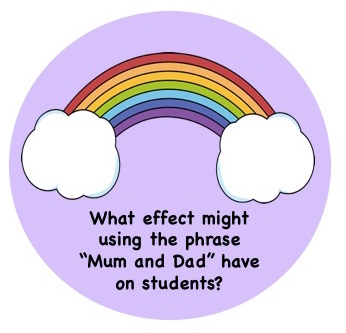
Why is the phrase “mum and dad” still used by educators? Surely we realise that these days many students are not part of a typical nuclear family (and I’m guessing this has always been the case). This may just sound like semantics to some, but I believe using this language at this very influential time in our students’ lives may be negatively impacting on their identities, confidence and sense of belonging.
The reason why this issue is so important to me is because part of my extended family does not consist of your typical mum and dad, two kids, family wagon, dog and cat. And it breaks my heart to think that the child in this non-traditional family is at risk of feeling disconnected from his school community as a result of the language that we use. It leads me to believe that there must be many other families out there that are similar (or should I say dissimilar). I think that we should be more aware of the different family units that our students come from.
In order to try and understand how students might feel about this issue, I attempted to put myself in the shoes of students from differing family units to imagine their response to the following question:
How do you feel when your teacher tells you to “go and ask your mum and dad for permission”?
(Please note that the names and responses I have included below are entirely fictional).
Nathan – Aged 5
Should I have a mum and a dad? I don’t really get it.
Sam – Aged 11
It used to really bother me. My teachers and all my friends know that I have two dads yet my teachers always tell us all to ask our “mums and dads”. One of my dads told me that my teachers don’t realise that what they’re saying upsets me so I’m okay about it now.
Alicia – Aged 8
When my teacher says this to me I remind her that I don’t have a dad. This seems to irritate her though and she says “You know what I mean… Obviously you need to ask your mum.”
Cara – Aged 10
It makes me want to get up and scream at my teachers. Do they not even care? Have they forgotten already? It was only last year. He was the best dad in the world. I don’t want to be reminded every day that he is gone.
Helen – Aged 6
What do you mean ‘How do I feel’? I just ask my mum and dad. I guess, sometimes I feel annoyed when mum and dad don’t let me do stuff. My mum is more likely to say ‘yes’ so sometimes I just ask her.
Through these responses I’ve tried to illustrate how the use of the phrase “mums and dads” may affect children of different ages from different family units.
Nathan’s response highlights that up until now his idea of ‘normal’ is different to what teachers assume is normal. He is beginning to wonder whether he is different.
Alicia wants her teacher to acknowledge that the phrase “mum and dad” does not apply to her family unit.
Sam, on the other hand, has obviously struggled with the phrase but has just come to accept that the language is going to be used.
Cara’s response highlights just how (albeit unintentionally) inconsiderate misusing this kind of language can be.
Helen’s thoughts illustrate that for someone from a ‘typical’ family, the phrase “mum and dad” is so normal that the point of the question can be missed entirely. Her response highlights that it is equally important for students with a mum and a dad to be aware that although their family unit is the most common type of family, others exist and are just as special and ‘normal’. Helen’s response may also help educators who have been brought up in typical family units to see why they have overlooked the complexity of this issue in the past, and upon reflection, how important it is that they do something about it.
I have hoped to illustrate how using the phrase “mum and dad” affects a wide range of students in different ways. While as educators we are now aware enough to know not to address letters to “mums and dads”, I think the critical next step is to stop using this language when speaking to our students.
Given that books and television programs reinforce the idea that everyone has a Mum and Dad (think Peppa Pig, Bananas in Pyjamas, Peter Rabbit, The Simpsons, Dora the Explorer, Spongebob Squarepants, Charlie and Lola, Olivia) (point made!) it is up to us as educators to challenge this concept as the norm.
I’m not saying that we should start telling kids to ask their legal guardian or to run through all of the potentially relevant terms every time a student needs to ask their family a question i.e. Mum/Dad/Mum and Dad/Dads/Mums/Aunty/Uncle/Aunty and Uncle/significant adult and the list could go on… rather we could use terms such as “family” or “parents”, or phrases like “people who you live with” to challenge the assumption that everyone has a mum and dad and ensure that all children feel included, regardless of their family type.
Credit to My Cute Graphics for the Graphic.